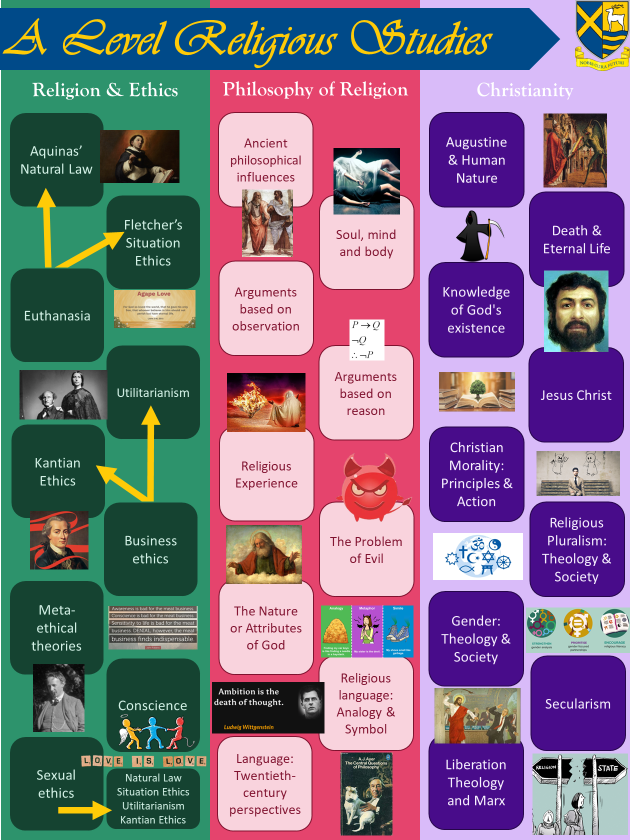OCR A Level in Religious Studies (H573)
| Curriculum Intent and Overview | |
|---|---|
| Students will aim to acquire a level of 'religious literacy', which means they will be able to investigate belief systems through varied experiences, approaches and disciplines, reflect on and express their own ideas, and the ideas of others, with precision and clarity, and become increasingly able to respond to beliefs in an informed, rational and insightful way. Ofsted states that learning in REP should not be confused with "mere facts", and they speak of three 'pillars of progression'. Progression, therefore, involves securing increased knowledge in the following three categories: ‘Substantive knowledge’ about various religious and non-religious traditions, ‘ways of knowing’ or how to understand and investigate religious and non-religious beliefs, and ‘personal knowledge’ which is an awareness of one’s own presuppositions and values about belief systems. We will enable students to partake in informed discussion about complex beliefs systems. Students should be able to understand, and question, the accuracy of claims about different belief systems, regardless of whether they are themselves religious or not. |
|
|
|
|
Exam Board: OCR
Specification Number: H573
76.92% of our latest cohort achieve a grade C or above
What will be studied?
Philosophy of Religion
- Ancient philosophical influences
- Soul, mind and body
- Arguments based on observation
- Arguments based on reason
- Religious experience
- The Problem of Evil
- The Nature or Attributes of God
- Religious language
- Twentieth-century perspectives
Religion and Ethics
- Aquinas’ Natural Law
- Fletcher’s Situation ethics
- Kantian ethics
- Utilitarianism
- Euthanasia: applied to NML and SE
- Business ethics: applied to Kant and Utilitarianism
- Meta-ethical theories
- Conscience
- Sexual ethics: applied to all normative theories
Developments in Christian Thought
- Augustine's Teaching On Human Nature
- Christian Teachings on Heaven
- Knowledge of God's Existence
- The person of Jesus Christ
- Christian Moral Principles
- Christian Moral Action
- Religious Pluralism and Theology
- Religious Pluralism and Society
- Gender and Society
- Gender and Theology
- The Challenge of Secularism
- Liberation Theology and Marx

| ASSESSMENT | |
| Philosophy of Religion 120 Marks 2 Hour paper Answer 3 questions from a choice of 4 |
33% of total A Level |
| Religion and Ethics 120 Marks 2 Hour paper Answer 3 questions from a choice of 4 |
33% of total A Level |
| Developments in Christian Thought 120 Marks 2 Hour paper Answer 3 questions from a choice of 4 |
33% of total A Level |
What texts are recommended?
All OCR accredited Textbooks are linked via Google Classroom, students can look at copies in RP2 to decide which is right for them. The OCR Specification has a list of ‘contextual references which are useful for students reaching for the top grades. All students have access to RS Review and Dialogue articles in the Library and shared digitally.
Introduction texts for Philosophy of Religion, Ethics and Christian Thought are:
- Think: A Compelling Introduction to Philosophy by Simon Blackburn
- The Puzzle of Ethics by Peter Vardy and Paul Grosch
- Christianity: A Very Short Introduction by Linda Woodhead
Texts that are required reading are as follows:
- ‘Theology & Falsification: A Symposium’ A. Flew, R. M. Hare, and B. Mitchell
- Bible references: Genesis 3, Matthew 25:31–46, Mark 6:47–52, John 9:1–41, Matthew 5:17–48, Luke 15:11–32, Mark 5:24–34, Luke 10:25–37 and Ephesians 5:22–33
- The Holy See: Redemptoris Missio 55–57 and Mulieris Dignitatem 18–19
- Church of England: Sharing the Gospel of Salvation
What websites are recommended?
- Faculty of Divinity, University of Cambridge - ‘Cambridge in your classroom’ playlist
- Crash Course - ‘Psychology’ playlist, ‘Philosophy’ Playlist and videos on religion and history are useful.
- BBC Radio 4 - ‘History of Ideas’ playlist
- Wireless Philosophy has many specific videos that are useful
- Harvard University - ‘Justice with Michael Sandel’ is a must watch for ethics
- The Bible Project - explains relevant parts of Theology in an interesting way.
What equipment is needed?
A4 Ring Binder, hole punch, file dividers, lined paper, highlighters, pencils and pens.